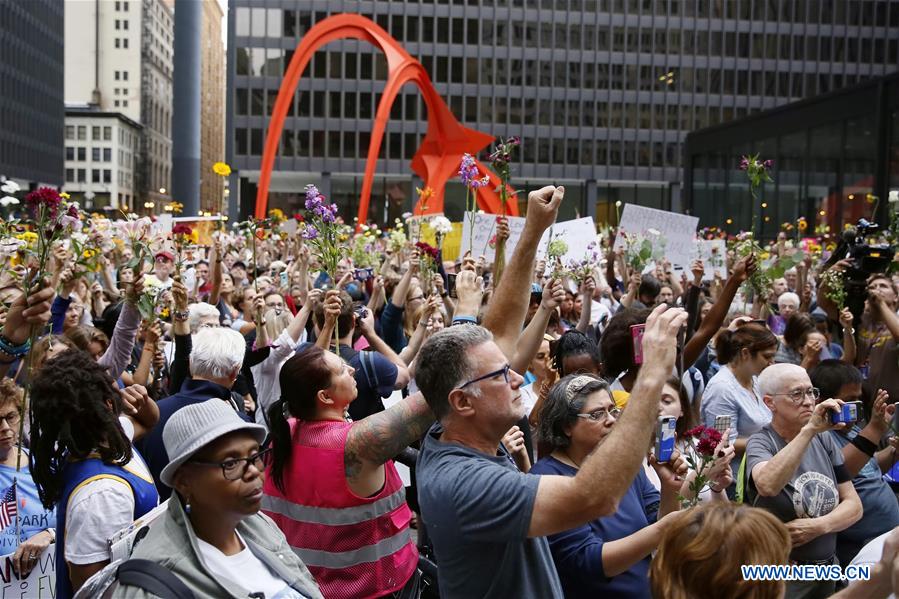Video PlayerClose

People raise flowers during an evening vigil at Federal Plaza in Chicago, the United States, on Aug. 13, 2017. Several hundred people joined a Sunday evening vigil at Federal Plaza in downtown Chicago, for those who fell victim to the violence in Charlottesville of Virginia during the weekend.(Xinhua/Wang Ping)
WASHINGTON, Aug. 16 (Xinhua) -- The latest remarks made by U.S. President Donald Trump to further correct his vague response to the Charlottesville violence fall still far short of pleasing any side amid social divides deepening in the United States.
"I think there's blame on both sides. I have no doubt about it, and you don't have any doubt about it either," Trump said Tuesday, three days after clashes between counter demonstrations in Charlottesville, a historic college town in the Virginia state, left three dead and 19 others injured.
Trump said the alt-left group were also "charging at the alt-right with clubs."
He said this after a condemnation on white supremacists, neo-Nazis and the Ku Klux Klan on Monday, two days after an initial statement blaming "many sides" for the Charlottesville violence came under attacks.
Trump's comments in continuous correction seem hardly to please any side facing severe social splits in the United States. In the spillover of the Charlottesville violence, three business executives quit Trump's advisory panel, the American Manufacturing Council for creating jobs.
"I have already made clear my abhorrence at the recent hate-spawned violence in Charlottesville, and earlier today I called on all leaders to condemn the white supremacists and their ilk who marched and committed violence," Brian Krzanich, chief executive officer (CEO) of Intel Corporation, wrote Monday in a blog posting.
"I resigned because I want to make progress, while many in Washington seem more concerned with attacking anyone who disagrees with them," he said.
He was the third CEO, after Kenneth Frazier of pharmaceutical giant Merck & Co., and Kevin Plank of athletic equipment maker Under Armour Inc., to exit the presidential advisory board the same day, all citing the Charlottesville violence.
Their moves reportedly marked a discontent at Trump's initial comment that "many sides" have displayed "hatred, bigotry and violence."
Experts believe the Charlottesville tragedy highlights the dangers of playing identity politics. It witnessed "another resurgence" of white nationalism, said Lee Cheng, co-founder and director of the Asian American Legal Foundation.
"It's a dangerous and regressive setback, but it's a natural and logical reaction to extreme non-white identity politics, which largely vilified white people and demanded power and wealth transfer on the basis of race and gender," he said.
Perry Bacon Jr., a political writer for FiveThirtyEight, an website that focuses on opinion poll analysis, echoed Cheng's views in his article titled Charlottesville And The Rise Of White Identity Politics posted online Monday.
"...now it appears that a kind of white identity politics is a key part of American politics," Bacon said.
From Richard Nixon to Ronald Reagan, presidents (mostly Republican) at least in recent decades have "regularly appealed to white, conservative-leaning voters by playing up fears and stereotypes about African-Americans and other minority groups," he noted.
According to Bacon, one of the two U.S. major "competing narratives" about race and racism is marked by the "Black Lives Matter" movement, and the other is conservatives' counter argument -- represented as "white lives matter" chanted by the white nationalists in Charlottesville.
The white and non-white identity politics "feeds on" each other, Cheng said.
